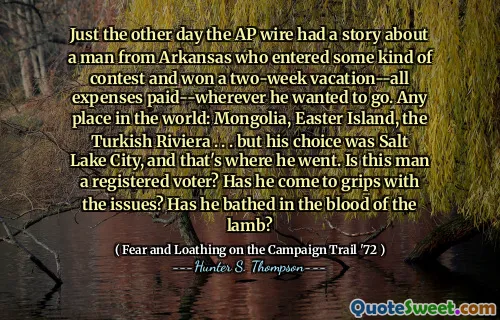
Once demagogy and falsehoods become routine, there isn't much for the political journalist to do except handicap the race and report on the candidate's mood.
The quote by George Packer shines a piercing light on the modern political landscape and the consequential challenges faced by political journalists. It vividly captures a concerning trend: when demagogy — appeals to emotion over rational argument — and falsehoods become the norm, political discourse degenerates into something superficial and predictable. The role of a political journalist, ideally a watchdog holding power to account and unraveling truth from lies, then diminishes to merely speculating on election outcomes and tracking the ephemeral moods of candidates.
This scenario underscores a deeper malaise within democratic systems. When truth-telling and rigorous debate are replaced by manipulation and deceit, the very foundation of informed citizenship is undermined. Citizens depend on journalists to filter, analyze, and contextualize political information, enabling meaningful engagement in the democratic process. However, when dishonesty becomes expected, journalism is forced into the role of entertainment or entertainment/news hybrid — focusing on spectacle and personality rather than substantive policy discussion.
Moreover, this quote compels reflection on the responsibility shared by both politicians and media practitioners. Politicians who resort to demagogy erode public trust, pushing journalism towards a reactive and performative stance. Similarly, journalists must reckon with how their coverage choices might inadvertently legitimize or amplify these falsehoods. There's a vicious cycle where sensationalism feeds demagoguery, which in turn breeds superficial coverage.
In a broader sense, Packer’s statement raises questions about the future of political journalism and, by extension, democracy itself. Can political journalists find new methods or standards to resist this collapse into routine falsehood? Might there be value in reinforcing journalistic integrity and encouraging media literacy among the public to resist facile narratives? Ultimately, this quote serves as a cautionary reminder not just about media but about the quality of political dialogue societies cultivate. Without commitment from all stakeholders to prioritize truth and substantive debate, the democratic process risks being hollowed out, leaving citizens and journalists alike disengaged and disempowered.
In sum, this quote is a compelling critique of the state of political communication and journalism, driving us to reflect on the essential roles of honesty, responsibility, and depth in public discourse.







